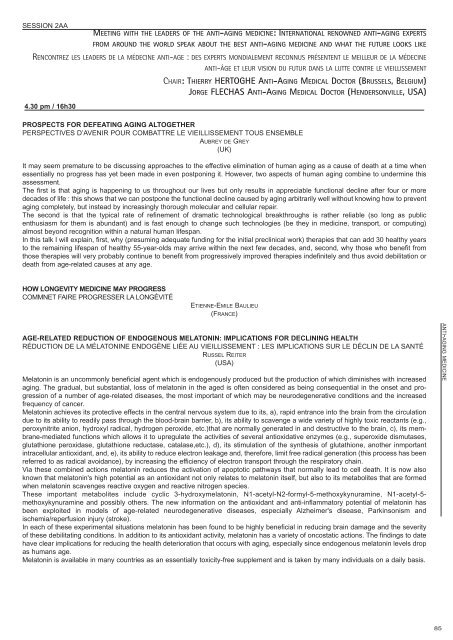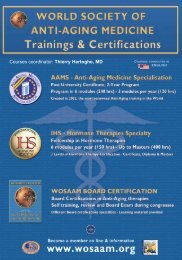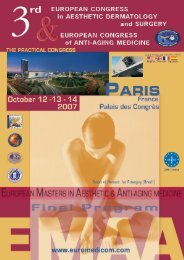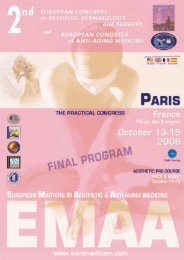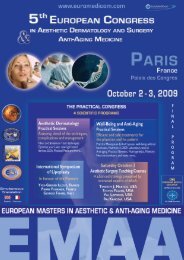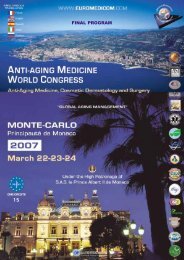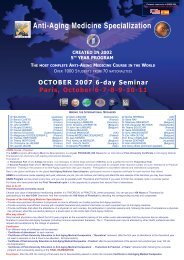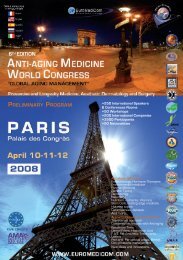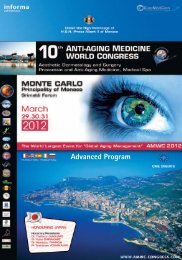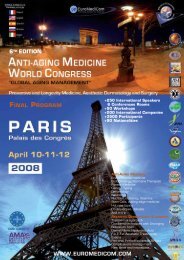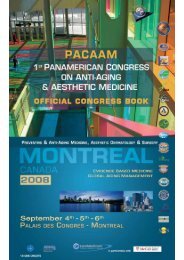FINAL PROGRAM 6TH EDITION - EuroMediCom
FINAL PROGRAM 6TH EDITION - EuroMediCom
FINAL PROGRAM 6TH EDITION - EuroMediCom
You also want an ePaper? Increase the reach of your titles
YUMPU automatically turns print PDFs into web optimized ePapers that Google loves.
SESSION 2AAMEETING WITH THE LEADERS OF THE ANTI-AGING MEDICINE: INTERNATIONAL RENOWNED ANTI-AGING EXPERTSFROM AROUND THE WORLD SPEAK ABOUT THE BEST ANTI-AGING MEDICINE AND WHAT THE FUTURE LOOKS LIKERENCONTREZ LES LEADERS DE LA MÉDECINE ANTI-AGE : DES EXPERTS MONDIALEMENT RECONNUS PRÉSENTENT LE MEILLEUR DE LA MÉDECINEANTI-ÂGE ET LEUR VISION DU FUTUR DANS LA LUTTE CONTRE LE VIEILLISSEMENT4.30 pm / 16h30CHAIR: THIERRY HERTOGHE ANTI-AGING MEDICAL DOCTOR (BRUSSELS, BELGIUM)JORGE FLECHAS ANTI-AGING MEDICAL DOCTOR (HENDERSONVILLE, USA)PROSPECTS FOR DEFEATING AGING ALTOGETHERPERSPECTIVES D’AVENIR POUR COMBATTRE LE VIEILLISSEMENT TOUS ENSEMBLEAUBREY DE GREY(UK)It may seem premature to be discussing approaches to the effective elimination of human aging as a cause of death at a time whenessentially no progress has yet been made in even postponing it. However, two aspects of human aging combine to undermine thisassessment.The first is that aging is happening to us throughout our lives but only results in appreciable functional decline after four or moredecades of life : this shows that we can postpone the functional decline caused by aging arbitrarily well without knowing how to preventaging completely, but instead by increasingly thorough molecular and cellular repair.The second is that the typical rate of refinement of dramatic technological breakthroughs is rather reliable (so long as publicenthusiasm for them is abundant) and is fast enough to change such technologies (be they in medicine, transport, or computing)almost beyond recognition within a natural human lifespan.In this talk I will explain, first, why (presuming adequate funding for the initial preclinical work) therapies that can add 30 healthy yearsto the remaining lifespan of healthy 55-year-olds may arrive within the next few decades, and, second, why those who benefit fromthose therapies will very probably continue to benefit from progressively improved therapies indefinitely and thus avoid debilitation ordeath from age-related causes at any age.HOW LONGEVITY MEDICINE MAY PROGRESSCOMMNET FAIRE PROGRESSER LA LONGÉVITÉETIENNE-EMILE BAULIEU(FRANCE)AGE-RELATED REDUCTION OF ENDOGENOUS MELATONIN: IMPLICATIONS FOR DECLINING HEALTHRÉDUCTION DE LA MÉLATONINE ENDOGÈNE LIÉE AU VIEILLISSEMENT : LES IMPLICATIONS SUR LE DÉCLIN DE LA SANTÉRUSSEL REITER(USA)Melatonin is an uncommonly beneficial agent which is endogenously produced but the production of which diminishes with increasedaging. The gradual, but substantial, loss of melatonin in the aged is often considered as being consequential in the onset and progressionof a number of age-related diseases, the most important of which may be neurodegenerative conditions and the increasedfrequency of cancer.Melatonin achieves its protective effects in the central nervous system due to its, a), rapid entrance into the brain from the circulationdue to its ability to readily pass through the blood-brain barrier, b), its ability to scavenge a wide variety of highly toxic reactants (e.g.,peroxynitrite anion, hydroxyl radical, hydrogen peroxide, etc.)that are normally generated in and destructive to the brain, c), its membrane-mediatedfunctions which allows it to upregulate the activities of several antioxidative enzymes (e.g., superoxide dismutases,glutathione peroxidase, glutathione reductase, catalase,etc.), d), its stimulation of the synthesis of glutathione, another inmportantintracellular antioxidant, and, e), its ability to reduce electron leakage and, therefore, limit free radical generation (this process has beenreferred to as radical avoidance), by increasing the efficiency of electron transport through the respiratory chain.Via these combined actions melatonin reduces the activation of apoptotic pathways that normally lead to cell death. It is now alsoknown that melatonin's high potential as an antioxidant not only relates to melatonin itself, but also to its metabolites that are formedwhen melatonin scavenges reactive oxygen and reactive nitrogen species.These important metabolites include cyclic 3-hydroxymelatonin, N1-acetyl-N2-formyl-5-methoxykynuramine, N1-acetyl-5-methoxykynuramine and possibly others. The new information on the antioxidant and anti-inflammatory potential of melatonin hasbeen exploited in models of age-related neurodegenerative diseases, especially Alzheimer's disease, Parkinsonism andischemia/reperfusion injury (stroke).In each of these experimental situations melatonin has been found to be highly beneficial in reducing brain damage and the severityof these debilitating conditions. In addition to its antioxidant activity, melatonin has a variety of oncostatic actions. The findings to datehave clear implications for reducing the health deterioration that occurs with aging, especially since endogenous melatonin levels dropas humans age.Melatonin is available in many countries as an essentially toxicity-free supplement and is taken by many individuals on a daily basis.ANTI-AGING MEDICINE85


